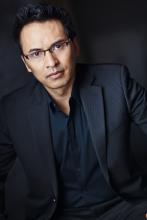Ben Gonio (PATP 2005) owns his own consulting business, teaches part-time at University of Washington Bothell, holds office hours at Startup Hall, continues to explore acting opportunities, and maintains a day job at Medex Northwest as part of a clinical team supporting medical education. After graduating with a BFA from Carnegie Mellon in 1998, Ben worked the regional theatre circuit and spent some time in Los Angeles before deciding to continue his acting studies in graduate school at the University of Washington School of Drama. He describes his post-graduation period of adjustment as “clunky.” Now he’s finding his niche as an artist in Seattle’s theatre community and as an artist in Seattle’s tech community.
What were your expectations going into grad school and joining the Seattle theatre community?
I knew I was going to have the opportunity to really explore roles and challenge perceptions. I just had a sense about Steve Pearson (former faculty) and the program being open to and embracing diversity—cultivating a student body that was diverse in its ideas and its representations of gender, belief systems, and culture. We were going to mix it up.
The theatre community in Seattle is so small, but it’s also complex and it’s constantly trying to do its best to be a mirror back to society. There are certain theatres where it makes sense to create a season that is entertaining and be of service to entertainment, but in my view the number one priority of theatre is to challenge its audience and its community; to make people debate and talk and be uncomfortable.
I just had a sense about Steve Pearson (former faculty) and the program being open to and embracing diversity—cultivating a student body that was diverse in its ideas and its representations of gender, belief systems, and culture. We were going to mix it up.
How might Seattle theatre serve its diverse communities?
We are at a precipice where Seattle is ripe for new works, pieces more representative of diversity. There has been a generational shift in leadership, but we need to work harder on educational outreach. We need to foster and nurture new writers of color and emerging artists in underserved communities. We need to be, as theatre artists, mentors to these underserved communities. If we’re consistent and relentless in our pursuit of new stories from other communities, these stories are going to work their way into the flagship theatres and they’re going to move people. They’re going to change the world. I want to be a part of that.
In addition to acting work, you also own a consulting business. How did you move into that space?
Right now, I’m giving in a way that is very creative. I’m parlaying my experience as a theatre artist to help CEOs, entrepreneurs, and software engineers sell their products better, with confidence, with impactful, emotional narratives that highlight human benefit.
I think innovation has always been part of the UW culture in terms of research in whatever field. When I was in grad school we were allowed to have the space to start where we were. We were enough. We didn’t have to be interesting for the sake of being interesting. Organic things really started to happen in terms of discovery during that period. There’s that period after graduation where you’re back in the real world trying to acclimate; trying to figure out what the next steps are. And I went through that.
I think innovation has always been part of the UW culture in terms of research in whatever field. When I was in grad school we were allowed to have the space to start where we were. We were enough.
Is there a lesson from grad school that has really stuck with you?
The teachers were always so good at empowering us and making sure that artists have the power. That was the lesson for me. Artists have the power to create anything that they want.
I recently coached a CEO from Jordan, a very dynamic man who came to me because he believed his accent was holding him back in some ways. We’ve had to do some work on how to navigate biases and stay focused on message and content—how to stay powerful amidst chaos and scrutiny. This is a Middle Eastern man who is innovating what could change the world and I’m finding myself in a position to make a difference. I can make a difference by empowering him, making his message about the human benefit beyond color and ethnic lines. I have to believe that there’s an opportunity to do that here and that’s what excites me.

